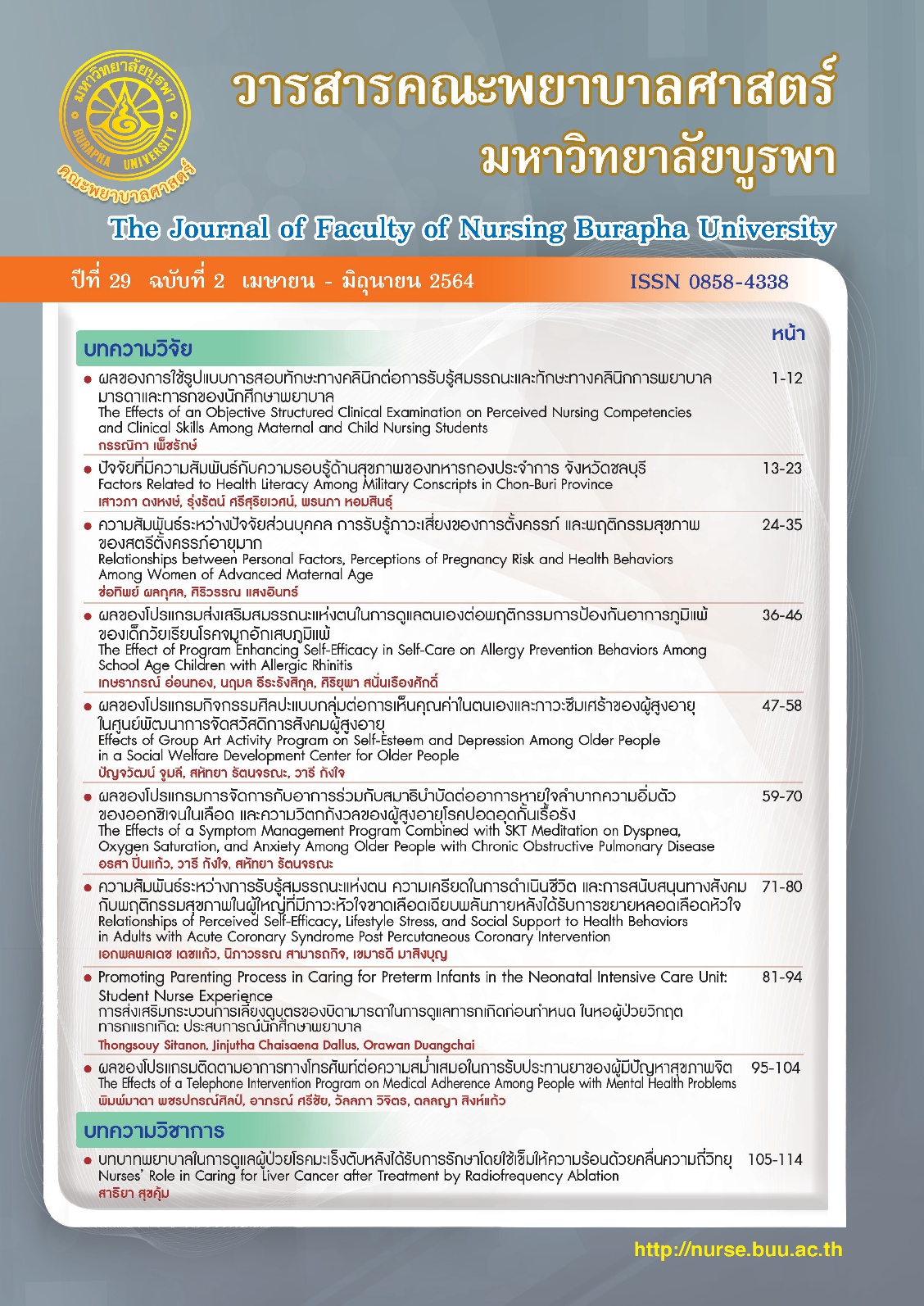Promoting Parenting Process in Caring for Preterm Infants in the Neonatal Intensive Care Unit: Student Nurse Experiences
Keywords:
Promoting parenting process, student nurse, theoretical parenting model, inductive content analysisAbstract
The purpose of this descriptive qualitative study was to describe student nurse experiences in
caring for parents of premature infants in a neonatal intensive care unit (NICU). Twelve senior student
nurses who completed their NICU clinical practice participated in the study. A semi-structured interview
guide with open-ended questions used along with audio-taped recordings. After each interview, the
tape was transcribed verbatim. The data were analyzed using inductive content analysis.
The results revealed that supporting parental care was the main category to describe the
student nurse experiences in the NICU. This main category consisted of three generie categories and
thisteen sub-categories. Three generic categories were encouraging parental visits, promoting parental
care, and supporting parents emotionally. Among thirteen sub-categories, fve sub-categories described
encouraging parental visits, two subcategories described supporting parents emotionally, and the rest
delineated promoting parental care.
In conclusion, supporting parental care during infant hospitalization is an important role of
neonatal nurses in the NICU. These student experiences can be used to guide the pediatric clinical
practice course design to train student nurses to support parents of premature infants during
hospitalization. This is even more important when parental care delivery is restricted due to the
COVID-19 pandemic.
References
Ajuebor, O., McCarthy, C., Li, Y., Al-Blooshi, S. M., Makhanya, N., & Cometto, G. (2019). Are the global strategic directions for strengthening nursing and midwifery 2016-2020 being implemented in countries? Findings from a cross-sectional analysis. Human Resources for health, 17(1), 1-10.
Bembich, S., Tripani, A., Mastromarino, S., Di Risio, G., Castelpietra, E., & Risso, F. M. (2021). Parents experiencing NICU visit restrictions due to COVID-19 pandemic. Acta Paediatrica, 110(3), 940-941.
Chawanpaiboon, S., Vogel, J. P., Moller, A. B., Lumbiganon, P., Petzold, M., Hogan, D., . . . Gulmezoglu, A. M. (2019). Global, regional, and national estimates of levels of preterm birth in 2014: a systematic review and modelling analysis. Lancet Glob Health, 7(1), e37-e46. doi:10.1016/S2214-109X(18)30451-0
Elo, S., & Kyngäs, H. (2008). The qualitative content analysis process. Journal of advanced nursing, 62(1), 107-115.
Filippa, M., Saliba, S., Esseily, R., Gratier, M., Grandjean, D., & Kuhn, P. (2021). Systematic review shows the benefts of involving the fathers of preterm infants in early interventions in neonatal intensive care units. Acta Paediatr. doi:10.1111/apa.15961
Franck, L. S., McNulty, A., & Alderdice, F. (2017). The perinatal-neonatal care journey for parents of preterm infants. The Journal of Perinatal & Neonatal Nursing, 31(3), 244-255.
Gutiérrez, S. S. R., García, P. E., Prellezo, A. S., Paulí, L. R., Del Castillo, B. L., & Sánchez, R. B.
(2020). Emotional support for parents with premature children admitted to a neonatal intensive care unit: a qualitative phenomenological study. The Turkish journal of pediatrics, 62(3), 436-449.
Hearn, G., Clarkson, G., & Day, M. (2020). The role of the NICU in father involvement, beliefs, and confdence: A follow-up qualitative study. Advances in Neonatal Care, 20(1), 80-89.
Hee Chung, E., Chou, J., & Brown, K. A. (2020). Neurodevelopmental outcomes of preterm infants: a recent literature review. Transl Pediatr, 9(Suppl 1), S3-S8. doi:10.21037/tp.2019.09.10
Im, M., & Oh, J. (2021). Nursing support perceived by mothers of preterm infants in a neonatal intensive care unit in South Korea. Child Health Nursing Research, 27(2), 146-159.
Kinpoon, K., & Chaiyarach, S. (2021). The incidence and risk factors for preterm delivery in northeast Thailand. Thai Journal of Obstetrics and Gynaecology, 29(2), 100-111.
Klawetter, S., Greenfeld, J. C., Speer, S. R., Brown, K., & Hwang, S. S. (2019). An integrative review: maternal engagement in the neonatal intensive care unit and health outcomes for US-born preterm infants and their parents. AIMS public health, 6(2), 160.
Lugli, L., Pugliese, M., Plessi, C., Berardi, A., Guidotti, I., Ancora, G., . . . Boncompagni, A. (2020). Neuroprem: the neuro-developmental outcome of very low birth weight infants in an Italian region. Italian Journal Pediatriics, 46(1), 1-7. doi:10.1186/s13052-020-0787-7
Özdemir, F. K., & Alemdar, D. K. (2017). Supporting of the fathers to visit their infants in neonatal intensive care unit decreases their stress level: a pretest–posttest quasi-experimental study. Community mental health journal, 53(4), 490-495.
Pillai, A., Pournami, F., Prabhakar, J., & Jain, N. (2021). Effect of early parent participation program on physiological stability in preterm infants: A randomized controlled trial. American Journal of Perinatology. DOI: 10.1055/s-0041-1726126
Piriyapokin, N., Chuthapisith, J., Emrat, K., & Nuntnarumit, P. (2020). Outcomes of preterm infants born with marginal viability in a University Hospital in Thailand. J Paediatr Child Health, 56(6), 943-949. doi:10.1111/jpc.14782
Seiiedi-Biarag, L., Mirghafourvand, M., Esmaeilpour,K., & Hasanpour, S. (2021). A randomized
controlled clinical trial of the effect of supportive counseling on mental health in Iranian mothers of premature infants. BMC Pregnancy and Childbirth, 21(1), 1-11.
Sharp, M., French, N., McMichael, J., & Campbell, C. (2018). Survival and neurodevelopmental outcomes in extremely preterm infants 22-24 weeks of gestation born in Western Australia. J Paediatr Child Health, 54(2), 188-193. doi:10.1111/jpc.13678
Sitanon, T. (2009). Thai parents’ experiences of parenting preterm infants during hospitalization in the neonatal intensive care unit: University of Washington.
Thailand Nursing and Midwifery Council. (2005). Standard of Nursing and Midwifery Service in Secondary and Tertiary Level. Nontaburi: Thailand Nursing and Midwifery Council.
Treyvaud, K., Spittle, A., Anderson, P. J., & O’Brien, K. (2019). A multilayered approach is needed in the NICU to support parents after the preterm birth of their infant. Early Human Development, 139, 1-5.
Walani, S. R. (2020). Global burden of preterm birth. International Journal of Gynecology & Obstetrics, 150(1), 31-33.
WHO, U., & Mathers, C. (2016). Global strategy for women’s, children’s and adolescents’ health (2016-2030). Organization, 201, 4-103.
World Health Organization [WHO]. (2013). Transforming and scaling up health professionals’ education and training: World Health Organization guidelines 2013: World Health Organization.
Zhang, R., Huang, R. W., Gao, X. R., Peng, X. M., Zhu, L. H., Yu, X., Zhang, J., & Yuan, L. (2020). Chinese parents’ lived experiences of having preterm infants in NICU: A qualitative study. Journal of Pediatric Nursing, 50, e48-e54. doi:10.1016/j.pedn.2019.11.002





